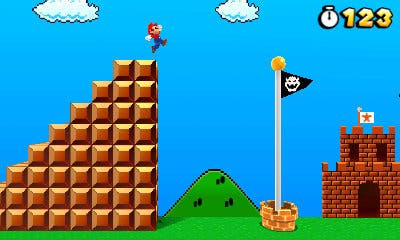Saturday Soapbox: 3DS Six Months On
Charting a troubled launch.
In hindsight, I should have listened to my mum. You see, mum loves Nintendo handhelds, and has owned every single major new model since the original Game Boy.
So she was as excited to see 3DS as I was to show her when I took one back to my parents' house with a bunch of games just before it launched in the UK in March.
And, for the first time ever, she was utterly underwhelmed. "The 3D is annoying. What's the point of it? And I don't like any of these games". More damningly, she said it felt like a "backward step" from her beloved DSi XL (her platform of choice because of the screen size).
At the time, this was the first unequivocally negative reaction I'd encountered. The pre-launch hype from all quarters (including myself) was overwhelmingly positive: Nintendo was the company to single-handedly popularise stereoscopic 3D with its glasses-free revolution.
In the UK, Nintendo was reporting record pre-orders and the trade (again, myself included) fully expected it to smash the PSP's sales record to become another instant smash-hit for the company. And then it launched.
The first sign something wasn't quite right was how long it took Nintendo to announce launch sales. The press release announcing sales of 113,000 in the UK didn't come until the end of the following week - and tucked away in the small print was the line: "Sales figures source: Nintendo UK internal Sell-thru Panel w/e 26th March 2011".
The reason why that was interesting is because it is, shall we say, highly unusual not to use data from Chart-Track, the official body that collates hardware and software sales in the UK.
Chart-Track issued its own figure to subscribers earlier that week (which can't be reported, but you can assume it was lower), and Nintendo decided to issue its own. Curious.
To be clear: in no sense is 113,000 consoles sold in two days a "bad" launch or a "low" figure - it was, after all, one of the best console launches ever. No, what surprised industry watchers was that it wasn't bigger.

After all, Nintendo had trumpeted pre-orders of 140,000 in the UK - which apparently and strangely did not convert directly into sales. More telling, though, were the software sales figures. Lego Star Wars made it to No.2 in the all-formats countdown, with Super Street Fighter IV the top 3DS exclusive at No.4. But that only paints half a picture.
Again, I'm not allowed to share the numbers, but the total figure for the top ten 3DS games added together was fewer than Crysis 2 sold to top the chart that week.
As many, many people have since observed, there were some very good games in the launch line-up, but no obvious, system-selling 'killer app'. No Mario, no Zelda, no Pokémon. And that's because Nintendo actually treated 3D as the killer app. And that proved a serious mistake.
"3D TECHNOLOGY EMBRACED THROUGH NINTENDO 3DS", screamed the post-launch press release. All the messaging, all the TV ads were focused on 3D. Then all that awkward '3DS causes headaches' business started in the press and sales began to tail off.
Few, least of all Nintendo, had expected this and suddenly the company found itself with an expensive new handheld console whose sales were going south, and a dearth of exciting software to fire it back into action.
Nothing showed more clearly where things had gone wrong than the launch of the Ocarina Of Time remake - a game well over a decade old, but one of sufficient stature to bring 3DS owners out in force and make it by some distance the system's fastest-selling game.

